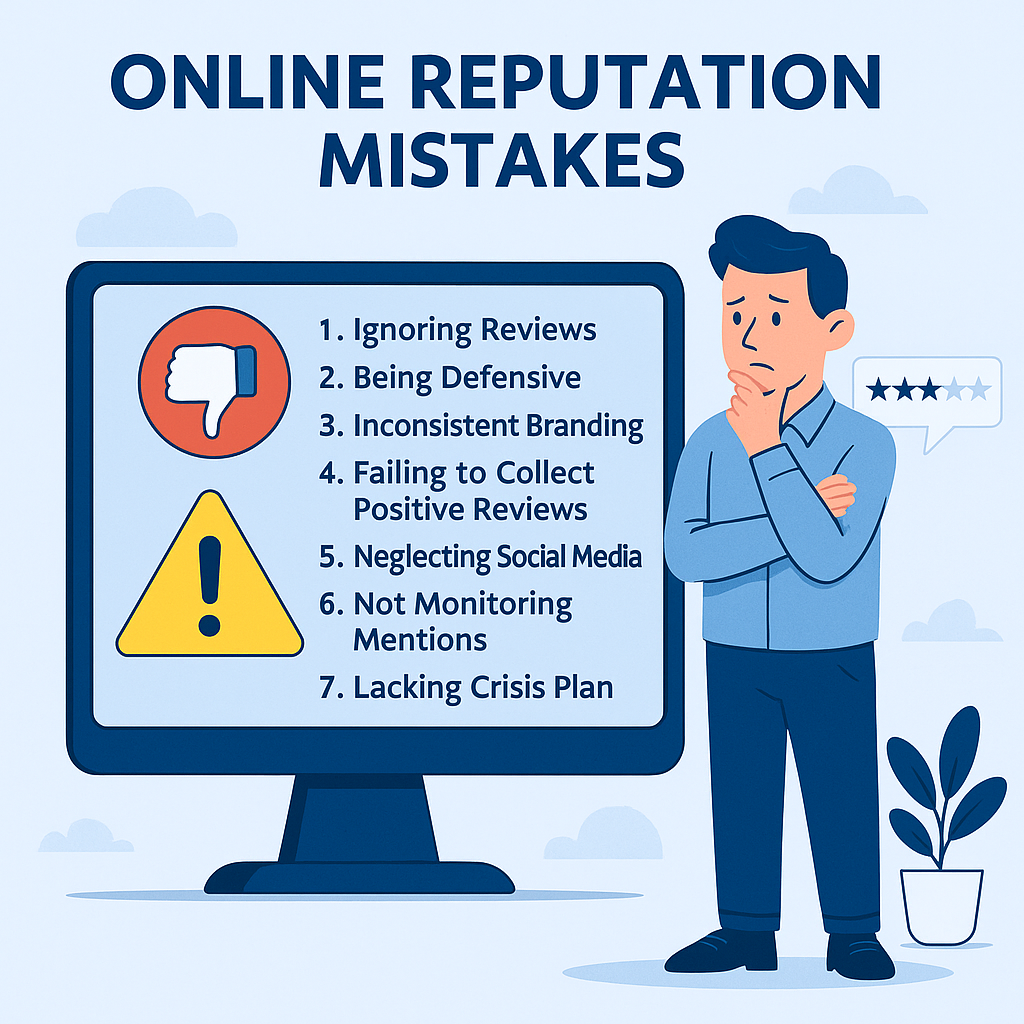
Top 7 Mistakes Businesses Make When Managing Online Reputation
Published: July 2025
Online reputation is no longer a side issue—it’s central to how customers perceive and engage with your business. Yet even experienced teams often make avoidable mistakes that damage credibility, reduce conversions and weaken customer loyalty.
In this article, we’ll explore the seven most common reputation management errors and how you can avoid them.
Mistake 1: Ignoring Reviews and Feedback
One of the biggest missteps is assuming you can simply ignore reviews—especially negative ones. Customers expect businesses to respond. When they see no reply, they interpret silence as indifference.
How to fix it: Monitor all major review platforms. Aim to reply to every review within 48 hours. Thank customers for positive feedback and address criticism with professionalism and empathy.
Mistake 2: Being Defensive or Dismissing Complaints
It’s natural to feel frustrated by unfair criticism, but reacting emotionally only fuels the fire. Public arguments show prospective customers that you can’t handle feedback constructively.
How to fix it: Stay calm. Acknowledge the issue, apologise where appropriate, and offer a solution. Even if you disagree with the reviewer, remain courteous.
Mistake 3: Inconsistent Branding and Messaging
If your website, social media and directory listings show different addresses, opening hours or brand messages, customers lose confidence. Inconsistent information is a red flag.
How to fix it: Audit all online properties regularly. Use a brand style guide to maintain consistency across platforms.
Mistake 4: Failing to Collect Positive Reviews
Many businesses are so busy putting out fires that they forget to proactively build positive reputation. This leaves your online presence unbalanced and dominated by a few loud critics.
How to fix it: Ask satisfied customers to share their experiences. Follow up after purchases or projects, making it easy to leave a review.
Mistake 5: Neglecting Social Media Engagement
An inactive or ignored social media page signals neglect. Customers expect timely responses and evidence that you’re listening.
How to fix it: Assign someone to monitor your social channels daily. Respond to questions and comments quickly, even if it’s just to acknowledge and follow up later.
Mistake 6: Not Monitoring Mentions Beyond Reviews
Reputation isn’t built only in review platforms. Forums, blogs, and social conversations all shape public perception. Failing to monitor these spaces means you could miss damaging narratives.
How to fix it: Set up Google Alerts, use monitoring tools like Brand24, and check relevant hashtags regularly to stay informed.
Mistake 7: Lacking a Crisis Response Plan
When a PR crisis hits, time is critical. If your team doesn’t have a clear protocol, delays can make the problem worse and amplify negative coverage.
How to fix it: Create a response plan outlining who handles communication, what channels to use and how to escalate issues internally.
Case Study: A Retailer’s Turnaround
A mid-sized retailer in Manchester saw sales decline after negative reviews about delivery delays. Initially, they ignored complaints, assuming the problem would fade. Instead, the reviews accumulated.
Finally, they implemented a structured response plan, acknowledged issues publicly and improved processes. Within three months, average review scores improved from 2.8 to 4.2 stars, and online conversions rebounded by 25%.
Key Takeaways
Reputation management is an ongoing commitment, not a one-off project. By avoiding these common mistakes, you can build credibility, earn customer trust and maintain a positive brand image even during challenges.
📣 Ready to take control of your online reputation?
Contact us today for a free consultation on proactive reputation management.